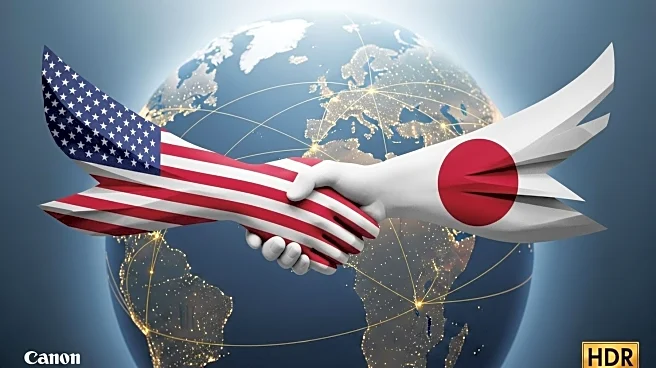What's Happening?
President Trump has signed an Executive Order to implement a framework agreement between the United States and Japan, announced on July 22, 2025. This agreement grants American producers and manufacturers over $15 billion in access to Japanese markets, while addressing U.S. national security needs. Key components include Japan's commitment to purchase $8 billion in U.S. agricultural goods and $7 billion annually in U.S. energy, including liquified natural gas. Additionally, Japan will recognize U.S. automotive standards, lifting restrictions on U.S. car and truck imports. The agreement also includes a baseline 15 percent tariff on nearly all Japanese imports, with specific tariffs for sectors like steel, aluminum, and pharmaceuticals.
Why It's Important?
The framework agreement marks a significant advancement in U.S.-Japan trade relations, promising substantial economic benefits for both nations. For the U.S., the agreement is expected to create hundreds of thousands of jobs and expand domestic manufacturing. Japan's $550 billion investment commitment will fund critical U.S. industries, enhancing national and economic security. This deal also aims to bolster supply chain resilience and innovation, addressing non-market policies and improving investment security. The agreement is poised to strengthen bilateral ties and promote reciprocal trade, benefiting American farmers, energy producers, and automakers.
What's Next?
The implementation of this agreement will likely lead to increased economic activity and job creation in the U.S. as Japan's investments begin to flow into selected projects. Stakeholders in agriculture, energy, and automotive sectors are expected to see immediate benefits. The U.S. and Japan will continue to collaborate on enhancing economic and national security alignment, focusing on supply chain resilience and innovation. Monitoring the impact of tariffs and sector-specific treatments will be crucial in assessing the long-term effects of the agreement.
Beyond the Headlines
This agreement could set a precedent for future international trade deals, emphasizing the importance of balancing market access with national security concerns. The focus on clean energy and sustainable practices reflects a growing trend towards environmentally conscious trade policies. The deal may also influence other nations to reconsider their trade barriers and standards, potentially leading to more open and fair global trade practices.










